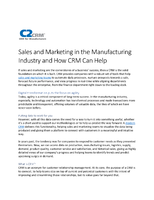Conference to discuss what military needs from EMS providers.
Share:
Press Release Summary:
Scheduled for Sept 15, 2010, IPC Conference for the North American EMS Industry will help Electronics Manufacturing Services companies understand what the military needs from them, important steps they need to take to comply with government restrictions, and how to obtain proper certifications to become an in-demand supplier. Some presentations will include insights from military OEM; strategies for controlling counterfeit parts; and ways to navigate complexities of ITAR and EAR compliance.
Original Press Release:
IPC Conference on the Military Market Offers Solutions and Opportunities for the North American EMS Industry
BANNOCKBURN, Ill., USA, - What does the U.S. military need from electronics manufacturing services (EMS) providers both now and in the future? Which certifications are critical to becoming a supplier to the military? What are the best practices for managing export controls and developing an anti-counterfeit parts program? Providing answers to these questions and many of the complex challenges faced by EMS suppliers to the military will be the focus of the IPC Conference for the North American EMS Industry: What It Takes to Supply the Military, September 15, 2010, at the Embassy Suites Washington D.C. - Convention Center.
Designed for decision makers in the EMS industry as well as representatives from OEMs, PCB fabricators and suppliers, the conference will offer essential, up-to-date information from noted experts to help EMS companies understand what the military needs from them, the important steps they need to take to comply with government restrictions, and how to obtain proper certifications to become an in-demand supplier. Presentations will include insights from a military OEM; strategies for controlling counterfeit parts; ways to best navigate the complexities of International Traffic in Arms Regulations (ITAR) and Export Administration Regulations (EAR) compliance; an overview of a military roadmap for the electronics assembly industry; and discussion about the IPC Intellectual Property Standard.
With the Obama administration's National Export Initiative calling for a doubling of exports over the next five years, Robert Davis, vice president of Excelerate, warns, "This area of export regulation is changing, so people really need to pay attention." Much of the complexity involves the government's regulations set in place to protect or control the export of U.S. defense information, articles and services. Davis' session, Solving the Challenges of Export Restrictions, will examine the many ways that companies run afoul of government restrictions in regards to defense exports.
Along similar lines of providing critical guidance to EMS companies, Penumbra Strategies President Steve DeWaters will share his specialized knowledge of military and aerospace research in a session shedding light on the critical, niche certifications - from the obvious to the obscure - needed to work with the military.
Addressing the growing problem of counterfeiting, Bruce Mahone, director of Washington operations in the aerospace division at SAE International, will share insights into how EMS companies can develop counterfeit parts control plans. Mahone's presentation will cover the specific standards that have been designed for use by military manufacturers and contractors to help mitigate the risk of receiving and installing counterfeit parts.
Counterfeit components are not the only intellectual property (IP) that concerns the Department of Defense. Fern Abrams, IPC director of government relations and environmental policy, will provide an update on the IPC standard currently in development to protect IP during the manufacture of printed circuit boards. With both the commercial and government sectors' interest in protecting IP through supplier requirements and audits, the new standard is expected to elevate best practices in IP protection.
From Lockheed Martin CE&T, Steven Betza, corporate director of electronics engineering & packaging, will outline a technology roadmap for the assembly industry to identify and plan for the needs of the military. "Lockheed Martin will be looking for suppliers who can support advanced technical capabilities and the highest level quality product," says Betza.
For more information or to register for this conference, visit www.ipc.org/EMS-Military-Conference or contact Susan Filz at SusanFilz@ipc.org or +1 847-597-2884.
About IPC
IPC (www.IPC.org) is a global trade association based in Bannockburn, Ill., dedicated to the competitive excellence and financial success of its 2,700 member companies which represent all facets of the electronics industry, including design, printed board manufacturing, electronics assembly and test. As a member-driven organization and leading source for industry standards, training, market research and public policy advocacy, IPC supports programs to meet the needs of an estimated $1.7 trillion global electronics industry. IPC maintains additional offices in Taos, N.M.; Arlington, Va.; Garden Grove, Calif.; Stockholm, Sweden; Moscow, Russia; and Shanghai, Shenzhen and Beijing, China.




